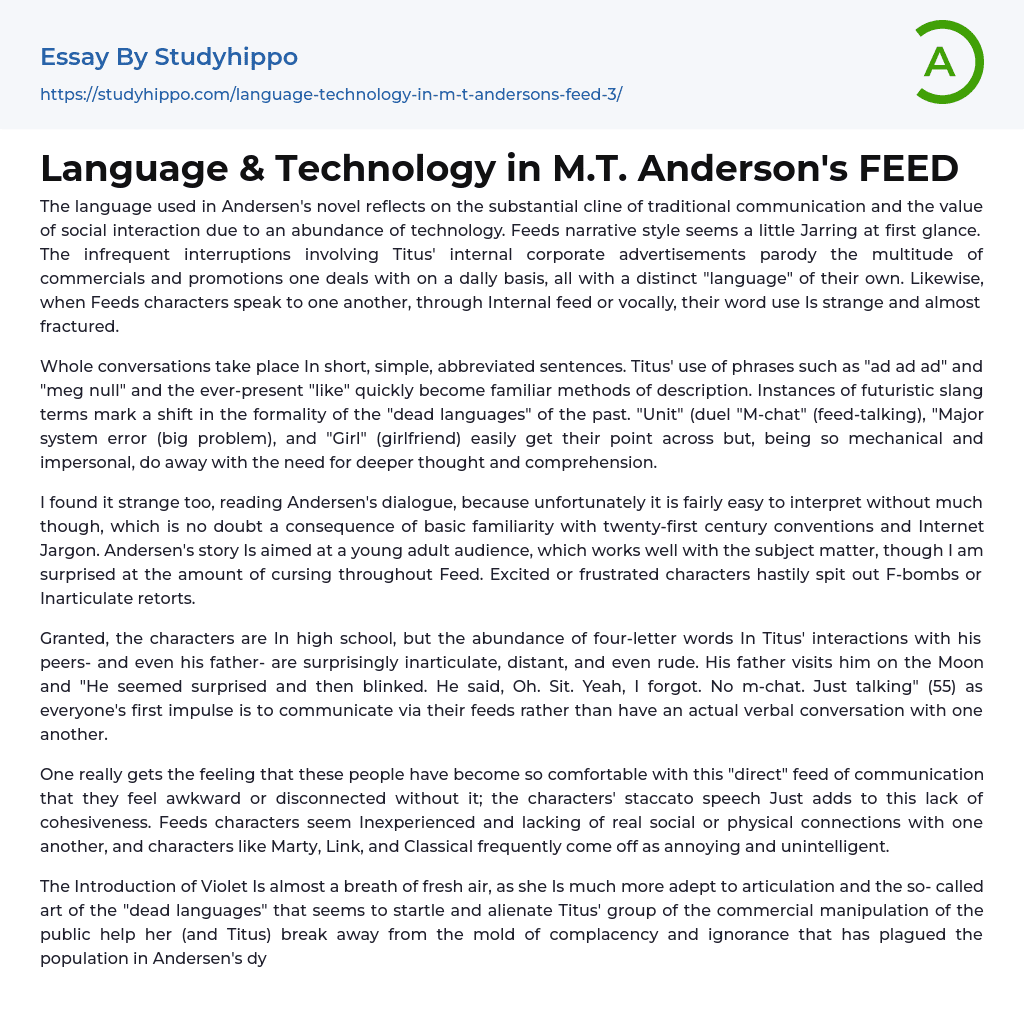

Language & Technology in M.T. Anderson’s FEED Essay Example
The language used in Andersen's novel reflects on the substantial cline of traditional communication and the value of social interaction due to an abundance of technology. Feeds narrative style seems a little Jarring at first glance. The infrequent interruptions involving Titus' internal corporate advertisements parody the multitude of commercials and promotions one deals with on a dally basis, all with a distinct "language" of their own. Likewise, when Feeds characters speak to one another, through Internal feed or vocally, their word use Is strange and almost fractured.
Whole conversations take place In short, simple, abbreviated sentences. Titus' use of phrases such as "ad ad ad" and "meg null" and the ever-present "like" quickly become familiar methods of description. Instances of futuristic slang terms mark a shift in the formality of the "dead languages" of the past. "Unit" (duel "M-chat"
...(feed-talking), "Major system error (big problem), and "Girl" (girlfriend) easily get their point across but, being so mechanical and impersonal, do away with the need for deeper thought and comprehension.
I found it strange too, reading Andersen's dialogue, because unfortunately it is fairly easy to interpret without much though, which is no doubt a consequence of basic familiarity with twenty-first century conventions and Internet Jargon. Andersen's story Is aimed at a young adult audience, which works well with the subject matter, though I am surprised at the amount of cursing throughout Feed. Excited or frustrated characters hastily spit out F-bombs or Inarticulate retorts.
Granted, the characters are In high school, but the abundance of four-letter words In Titus' interactions with his peers- and even his father- are surprisingly inarticulate, distant, and even rude. His father
visits him on the Moon and "He seemed surprised and then blinked. He said, Oh. Sit. Yeah, I forgot. No m-chat. Just talking" (55) as everyone's first impulse is to communicate via their feeds rather than have an actual verbal conversation with one another.
One really gets the feeling that these people have become so comfortable with this "direct" feed of communication that they feel awkward or disconnected without it; the characters' staccato speech Just adds to this lack of cohesiveness. Feeds characters seem Inexperienced and lacking of real social or physical connections with one another, and characters like Marty, Link, and Classical frequently come off as annoying and unintelligent.
The Introduction of Violet Is almost a breath of fresh air, as she Is much more adept to articulation and the so- called art of the "dead languages" that seems to startle and alienate Titus' group of the commercial manipulation of the public help her (and Titus) break away from the mold of complacency and ignorance that has plagued the population in Andersen's dystrophy. In "the dimples of delicacy' chapter, Violet voices her discontent and helps ring home one of the novel's strongest messages: society overconfidence on technology is hindering us intellectually and socially.
Following Titus' standard "ad ad ad" summarization of Violet's argument, she explains "When you have the feed all your life, you're brought up not to think about things... Because of the feed, we're raising a nation of idiots. Ignorant, self-centered idiots" (113). Why put time and effort into articulating information when it can so easily be transferred so quickly without the mental effort? Her wording appears more thought-out and full-bodied compared
o the standard lingo of Titus' peers.
Anderson employs language in this way as a statement on how our values have shifted thanks to the changing dynamics of personal communication. Her thoughts and expressions feel more real than what is shown at the start of Feed. Without feeds, we owe it to ourselves to build stronger connections and really voice our thoughts and emotions in a way the novel's characters cannot. The novel may not necessarily be meant as a warning for what the future holds, but rather a statement about the world in which we are already living and the value we place on relating to others face-to-face.
Feed seems uncomfortably close to present day life, and sheds light on the effects of the continually evolving relationship between language and society, based on our values and technology. Electronic correspondence has changed and grown exponentially faster since its conception and our dependence on high-speed communication has certainly affected our speech patterns and our social expectations. One can only wonder if technology will continue distancing us from real interpersonal connections or if we will remain subscribed to the illusion that it brings us closer together.
- Electronics essays
- Computer Science essays
- Consumer Electronics essays
- Enterprise Technology essays
- Hardware essays
- Robot essays
- engineering essays
- people search essays
- Modern Technology essays
- Impact of Technology essays
- Cloud Computing essays
- Operating Systems essays
- Information Technology essays
- Data Analysis essays
- Information Age essays
- Smartphone essays
- Cell Phones essays
- Camera essays
- Computer essays
- Ipod essays
- Mobile Phones essays
- 3g essays
- Bluetooth essays
- Cell Phones in School essays
- Computer File essays
- Desktop Computer essays
- Servers essays
- Data collection essays
- Graphic Design essays
- Data Mining essays
- Cryptography essays
- Internet essays
- Network Security essays
- Android essays
- Computer Security essays
- World Wide Web essays
- Website essays
- Computer Network essays
- Application Software essays
- Computer Programming essays
- Computer Software essays
- Benchmark essays
- Information Systems essays
- Email essays
- Hypertext Transfer Protocol essays
- Marshall Mcluhan essays
- Virtual Learning Environment essays
- Web Search essays
- Etiquette essays
- Mainstream essays



